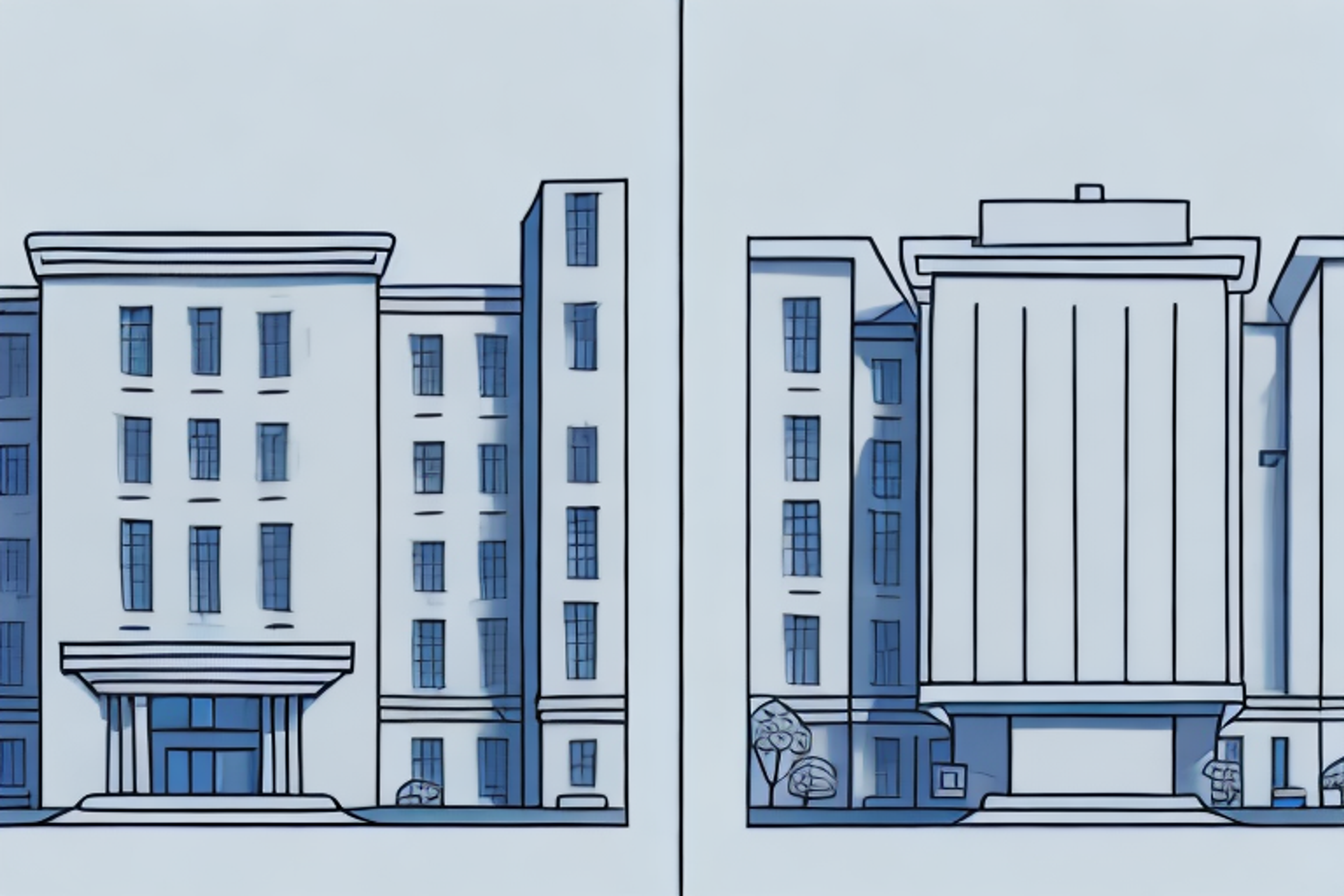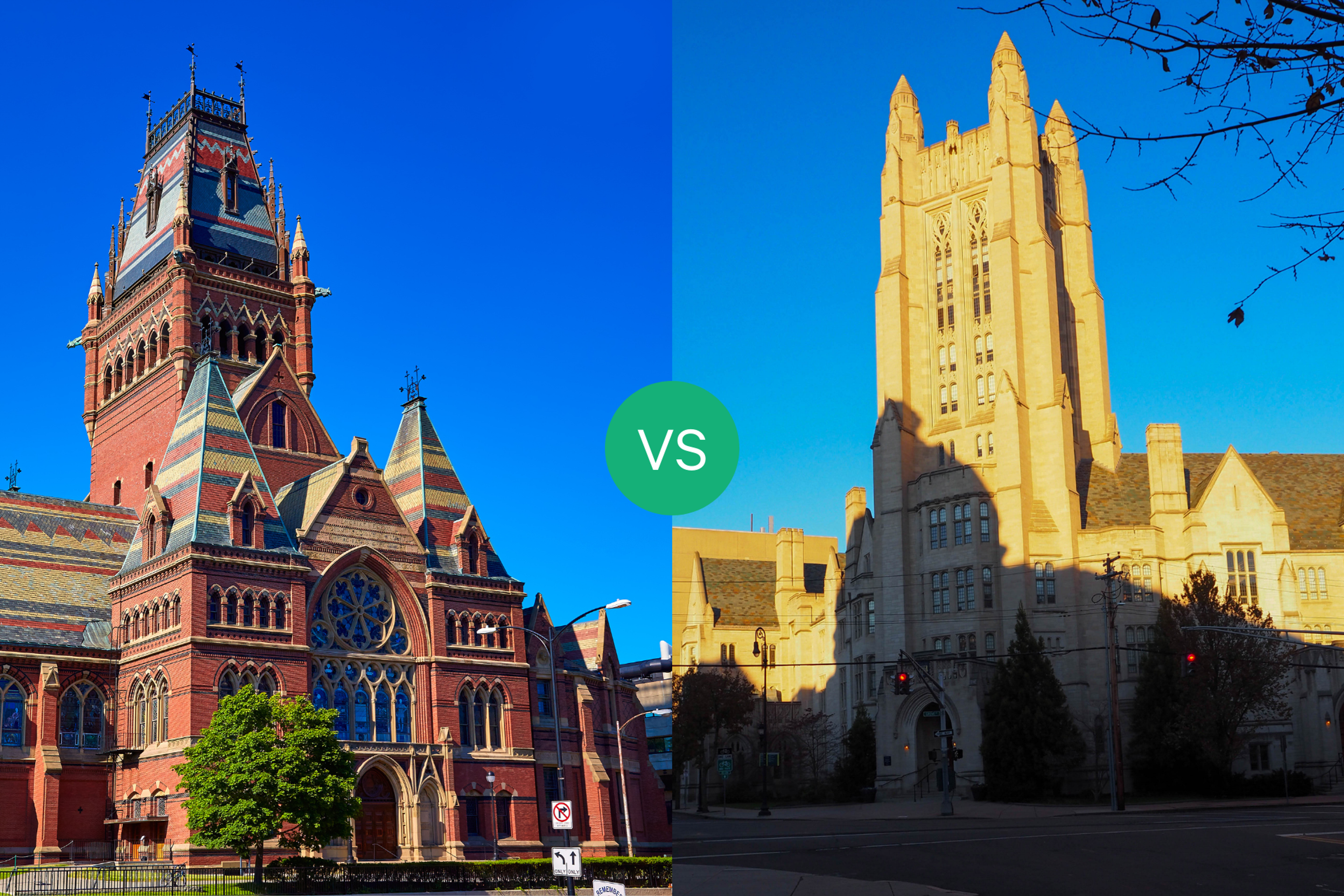Yale Law School Vs. Columbia Law School: An In-Depth Comparison
Are you considering attending law school but struggling to choose between Yale and Columbia? Look no further! Our in-depth comparison breaks down the differences in curriculum, faculty, and campus culture to help you make an informed decision.
Posted April 10, 2025

Table of Contents
Free Event

Featuring Indrani S.
Law School App Office Hours with a Former Stanford AdCom Member
Starting Thursday, April 17
11:30 PM UTC · 45 minutes

Featuring Indrani S.
Choosing the right law school is an important decision that can have a major impact on your future career prospects. Two of the top law schools in the United States are Yale Law School and Columbia Law School. In this in-depth comparison, we will explore the similarities and differences between these prestigious institutions to help you make an informed choice about which school is right for you.
Introduction: Understanding the Importance of Choosing the Right Law School
When it comes to law school, your choice of institution can have a significant impact on your future career prospects. A law degree from a top-ranked school can open doors to jobs at prestigious law firms, government agencies, and non-profit organizations. But not all law schools are created equal, and the decision about which school to attend should not be taken lightly. In this article, we will explore the differences between Yale Law School and Columbia Law School to help you make an informed decision.
One important factor to consider when choosing a law school is the location. Yale Law School is located in New Haven, Connecticut, while Columbia Law School is located in New York City. While both cities offer unique opportunities for networking and job prospects, New York City is often considered the hub of the legal industry, with a larger number of law firms and legal organizations headquartered there. However, New Haven offers a more intimate and supportive community for law students, with a lower cost of living and a quieter atmosphere for studying.
Overview of Yale Law School and Columbia Law School
Yale Law School is one of the most prestigious law schools in the world, renowned for its rigorous academic program, exceptional faculty, and tight-knit community of students and alumni. Founded in 1824, Yale Law School is located in New Haven, Connecticut and boasts a student body of around 650 students. Columbia Law School, founded in 1858, is situated in New York City and has a slightly larger student body of around 1,200 students. Like Yale, Columbia is also known for its academic excellence and faculty of renowned scholars and practitioners.
Despite their similarities, there are some notable differences between Yale Law School and Columbia Law School. For example, Yale Law School is known for its emphasis on public interest law and its commitment to social justice. In contrast, Columbia Law School has a strong focus on corporate law and is often considered a top choice for students interested in pursuing careers in business law.
Both schools offer a wide range of opportunities for students to gain practical experience through clinics, externships, and other hands-on learning opportunities. Additionally, both schools have active student organizations and a vibrant campus life, with numerous events and activities taking place throughout the year.
Admissions Criteria and Process: Which School is More Selective?
Both Yale Law School and Columbia Law School are highly selective institutions with rigorous admissions processes. According to 2020 data, Yale Law School had an acceptance rate of only 8%, while Columbia Law School accepted around 20% of applicants. Both schools place a significant emphasis on academic excellence, with applicants typically required to have strong grades and LSAT scores. However, Yale takes a more holistic approach to admissions, considering factors such as extracurricular activities, work experience, and personal background in addition to academic credentials.
In addition to the admissions criteria mentioned above, both Yale Law School and Columbia Law School also require applicants to submit letters of recommendation, personal statements, and transcripts from all undergraduate institutions attended. Yale Law School also offers an optional interview for applicants, which can provide an opportunity for them to showcase their personality and communication skills. Columbia Law School, on the other hand, places a greater emphasis on work experience and leadership potential, with many of its students having prior experience in fields such as finance, consulting, and government.
Faculty: Comparing the Quality and Experience of Professors
Yale Law School and Columbia Law School are both home to some of the most distinguished legal scholars and practitioners in the world. Yale Law School has a faculty of around 100 full-time professors, many of whom are widely recognized as leading experts in their fields. Columbia Law School also boasts a strong faculty with deep expertise in a range of legal subjects. Both schools place a significant emphasis on hiring faculty members who are not only leaders in their respective fields, but also committed teachers and mentors to their students.
One notable difference between the faculties at Yale and Columbia is their diversity. Yale Law School has made a concerted effort in recent years to increase the diversity of its faculty, with over 40% of its professors identifying as people of color. Columbia Law School, while also committed to diversity, has a slightly lower percentage of faculty members who identify as people of color.
Another factor to consider when comparing the quality and experience of professors at these two schools is their publication records. Both Yale and Columbia have faculty members who have published extensively in top legal journals and have authored influential books in their respective fields. However, Yale Law School has a slightly higher percentage of faculty members who have been awarded prestigious academic honors, such as the MacArthur Fellowship or the Pulitzer Prize.
Curriculum: Examining the Differences in Course Offerings and Specializations
Both Yale Law School and Columbia Law School offer a rigorous curriculum designed to prepare students for a wide range of legal careers. Yale Law School is known for its focus on public interest law and its unique small-group seminars, while Columbia Law School emphasizes courses in corporate law and international law. Both schools offer a wide range of legal specializations, including environmental law, human rights law, intellectual property law, and more.
However, there are some differences in the course offerings between the two schools. Yale Law School offers a greater number of courses in constitutional law, legal theory, and criminal law, while Columbia Law School offers more courses in securities regulation, antitrust law, and negotiation and conflict resolution.
In terms of specializations, Yale Law School has a strong program in law and technology, which includes courses on cybersecurity, privacy, and artificial intelligence. Columbia Law School, on the other hand, has a well-regarded program in law and economics, which explores the intersection of legal and economic principles in areas such as antitrust, intellectual property, and corporate law.
Student Life: Comparing Campus Culture, Extracurricular Activities, and Social Scene
The experience of attending law school is not just about academics, but also about the culture, community, and extracurricular activities available to students. At Yale Law School, students are known for their close-knit community, supportive atmosphere, and strong commitment to public interest law. Columbia Law School, located in the heart of New York City, offers students a wealth of opportunities to engage with the legal community, including internships, externships, and a vibrant student-run journal and moot court program.
On the other hand, Harvard Law School boasts a rich history and tradition of producing some of the most influential legal minds in the world. The campus culture at Harvard Law School is known for its intellectual rigor and competitive atmosphere, with students often engaging in lively debates and discussions both inside and outside the classroom. In terms of extracurricular activities, Harvard Law School offers a wide range of student organizations, including the Harvard Law Review, the Harvard Legal Aid Bureau, and the Harvard Defenders, which provide students with opportunities to gain practical legal experience and make a positive impact in their communities.
Career Prospects: Analyzing Job Placement Rates, Employers, and Salaries
Career prospects are a major consideration for anyone attending law school. Both Yale Law School and Columbia Law School have strong job placement rates, with around 90% of recent graduates securing employment within 10 months of graduation. Yale Law School graduates tend to pursue careers in public interest law and academia, while Columbia Law School graduates often go on to work at top law firms and in corporate law. Salaries for graduates of both schools are among the highest in the legal profession.
In addition to job placement rates and employers, it is important to consider the location of the law school when evaluating career prospects. Yale Law School is located in New Haven, Connecticut, which is home to a number of public interest organizations and government agencies. This provides students with ample opportunities to gain practical experience and make connections in these fields. Columbia Law School, on the other hand, is located in New York City, which is a hub for corporate law and finance. Students at Columbia have access to a wide range of law firms and financial institutions, which can be beneficial for those interested in these areas of law.
Another factor to consider when evaluating career prospects is the school's alumni network. Both Yale Law School and Columbia Law School have large and influential alumni networks, which can be a valuable resource for recent graduates. Alumni can provide mentorship, job leads, and other forms of support as graduates navigate the job market and build their careers.
Cost of Attendance: Comparing Tuition, Fees, Scholarships, and Living Expenses
The cost of attending law school is a significant consideration for most students. Yale Law School and Columbia Law School both have high tuition rates, with full-time tuition for the 2021-22 academic year at around $66,000 and $71,000 respectively. However, both schools also offer generous financial aid packages and scholarships to help ease the burden for students who demonstrate financial need. Living expenses in New Haven and New York City can also be significant, but both schools offer a range of affordable on-campus housing options for students.
Alumni Network: Evaluating the Strength and Reach of Each School's Alumni Association
The strength and reach of a school's alumni network can be an important factor in career and professional development. Both Yale Law School and Columbia Law School have strong alumni associations with active networks spanning a range of legal fields and industries. Yale Law School alumni include numerous Supreme Court justices, heads of state, and business leaders, while Columbia Law School alumni include successful attorneys, judges, and politicians.
Rankings and Reputation: How Do Yale Law School and Columbia Law School Compare?
Yale Law School and Columbia Law School are both highly regarded institutions with strong reputations among legal professionals, academics, and employers. According to U.S. News and World Report, Yale Law School is consistently ranked as the top law school in the country, while Columbia Law School typically ranks in the top five. Both schools are widely recognized for their academic excellence, faculty expertise, and commitment to producing leaders in the legal profession.
Conclusion: Which School is Right for You?
Choosing between Yale Law School and Columbia Law School ultimately depends on your personal goals, priorities, and interests. Both schools offer exceptional legal education and strong professional networks, but they differ in terms of location, culture, and areas of specialization. As you consider your options, we encourage you to take the time to carefully evaluate the factors that matter most to you, and seek out as much information as possible to make an informed decision.











